Abstract
This study assessed the knowledge of 82 married women about existing legislations and law enforcement structure in Iraqi Kurdistan region to combat violence against women and women’s response to spousal violence. A female physician interviewed the participants using a specially designed questionnaire. The women possessed good knowledge about the presence of legislation (76.8 %) and related law enforcement structure (70.7 % to 74.4 %) to combat violence against women, but they lacked adequate knowledge about how to contact the law enforcement agencies. Women’s response to spousal violence primarily included self-defense (37.8 %) or keeping silent (26.8 %), rather than seeking justice (4.9 %). Women’s educational status was positively associated with reporting violence to police (52.1 % vs 29.4 %, p = 0.041) and the health staff (62.5 % vs 35.3 %, p = 0.015). Further research is needed to explore the reasons behind women’s poor knowledge of the details of the existing law enforcement structure and women’s reluctance to seek justice.
Similar content being viewed by others
References
Abeya, S. G., Afework, M. F., & Yalew, A. W. (2012). Intimate partner violence against women in West Ethiopia: A qualitative study on attitudes, woman’s response, and suggested measures as perceived by community members. Reproductive Health, 9, 14. doi:10.1186/1742-4755-9-14.
Al-Atrushi, H. H., Al-Tawil, N. G., Shabila, N. P., & Al-Hadithi, T. S. (2013). Intimate partner violence against women in the Erbil city of the Kurdistan region, Iraq. BMC Womens Health, 13, 37. doi:10.1186/1472-6874-13-37.
Ali, A. A., Yassin, K., & Omer, R. (2014). Domestic violence against women in eastern Sudan. BMC Public Health, 14, 1136. doi:10.1186/1471-2458-14-1136.
Al-Tawil, N. G. (2012). Association of violence against women with religion and culture in Erbil, Iraq: A cross-sectional study. BMC Public Health, 12, 800. doi:10.1186/1471-2458-12-800.
Bohra, N., Sharma, I., Srivastava, S., Bhatia, M. S., Chaudhuri, U., Parial S., … Kataria, D. (2015). Violence against women. Indian Journal of Psychiatry, 57, S333-S338. doi:10.4103/0019-5545.161500.
Bott, S., Guedes, A., Goodwin, M., & Mendoza, J. (2012). Violence against women in Latin America and Caribbean: a comparative analysis of population-based data from 12 countries. Washington: Pan American Health Organization.
Coker, A. L., Smith, P. H., Bethea, L., King, M. R., & McKeown, R. E. (2000). Physical health consequences of physical and psychological intimate partner violence. Archives of Family Medicine, 9, 451–457. doi:10.1001/archfami.9.5.451.
Ellsberg, M., Jansen, H. A., Heise, L., Watts, C. H., Garcia-Moreno, C., & WHO Multicountry Study on Women’s Health and Domestic Violence against Women Study Team (2008). Intimate partner violence and women’s physical and mental health in the WHO multi-country study on women’s health and domestic violence: An observational study. Lancet, 371, 1165–1172. doi:10.1016/S0140-6736(08)60522-X.
Garcia-Moreno, C., Jansen, H. A. F. M., Ellsberg, M., Heise, L., & Watts, C. (2005). WHO Multicountry Study on Women’s Health and Domestic Violence against Women: initial results on prevalence, health outcomes, and women’s responses. Geneva: World Health Organization.
Garcia-Moreno, C., Jansen, H. A., Ellsberg, M., Heise, L., & Watts, C. (2006). Prevalence of intimate partner violence: Finding from WHO multi-country study on women’s health and domestic violence. Lancet, 368, 1260–1269. doi:10.1016/S0140-6736(06)69523-8.
Himabindu, B. L., Arora, R., & Prashanth, N. S. (2014). Whose problem is it anyway? Crimes against women in India. Global Health Action, 7, 23718. doi:10.3402/gha.v7.23718.
Iraqi Kurdistan Parliament (2011). Law number 8: Combating domestic violence in Iraqi Kurdistan Region. Waqaehi Kurdistan, 122:6–9. [Arabic]
Johnston, H. B., & Naved, R. T. (2008). Spousal violence in Bangladesh: A call for a public-health response. Journal of Health, Population and Nutrition, 26, 366–377.
Krug, E. G., Dahlberg, L. L., Mercy, J. A., Zwi, A. B., & Lozano, R. (2002). World report on violence and health. Geneva: World Health Organization.
Lagdon, S., Armour, C., & Stringer, M. (2014). Adult experience of mental health outcomes as a result of intimate partner violence victimisation: A systematic review. European Journal of Psychotraumatology, 5, 24794. doi:10.3402/ejpt.v5.24794.
Laisser, R. M., Lugina, H. I., Lindmark, G., Nystrom, L., & Emmelin, M. (2009). Striving to make a difference: Health care worker experiences with intimate partner violence clients in Tanzania. Health Care for Women International, 30, 64–78. doi:10.1080/07399330802523618.
Laisser, R. M., Nyström, L., Lugina, H. I., & Emmelin, M. (2011). Community perceptions of intimate partner violence - a qualitative study from urban Tanzania. BMC Womens Health, 11, 13. doi:10.1186/1472-6874-11-13.
Naved, R. T., & Akhtar, N. (2008). Wife abuse and suicidal ideation in rural Bangladesh. Womens Health Issues, 18, 442–452. doi:10.1016/j.whi.2008.07.003.
Semahegn, A., & Mengistie, B. (2015). Domestic violence against women and associated factors in Ethiopia; systematic review. Reproductive Health, 12, 78. doi:10.1186/s12978-015-0072-1.
Semahegn, A., Belachew, T., & Abdulahi, M. (2013). Domestic violence and its predictors among married women in reproductive age in Fagitalekoma Woreda, Awi zone, Amhara regional state, north western Ethiopia. Reproductive Health, 10, 63. doi:10.1186/1742-4755-10-63.
Spangaro, J. M., Zwi, A. B., Poulos, R. G., & Man, W. Y. (2010). Who tells and what happens: Disclosure and health service responses to screening for intimate partner violence. Health & Social Care in the Community, 18, 671–680. doi:10.1111/j.1365-2524.2010.00943.x.
Stop Violence Against Women (2008). New law criminalizing female circumcision in Iraq. http://www.stopvaw.org/New_Law_Criminalizing_Female_Genital_Mutilation_in_Iraq.html.
WHO (1999). Putting women first guidelines on ethics and safety for violence research. Geneva: World Health Organization.
WHO (2013). Responding to intimate partner violence and sexual violence against women: WHO clinical and policy guidelines. Geneva: World Health Organization.
WHO & PAHO. (2012). Understanding and addressing violence against women: Intimate partner violence. Geneva: World Health Organization. http://apps.who.int/iris/bitstream/10665/77432/1/WHO_RHR_12.36_eng.pdf
Author information
Authors and Affiliations
Corresponding author
Rights and permissions
About this article
Cite this article
Malik, I.A., Shabila, N.P. & Al-Hadithi, T.S. Women’s Knowledge of the Domestic Violence Legislation in Erbil, Iraq and their Response to Spousal Violence. J Fam Viol 32, 47–53 (2017). https://doi.org/10.1007/s10896-016-9829-8
Published:
Issue Date:
DOI: https://doi.org/10.1007/s10896-016-9829-8




